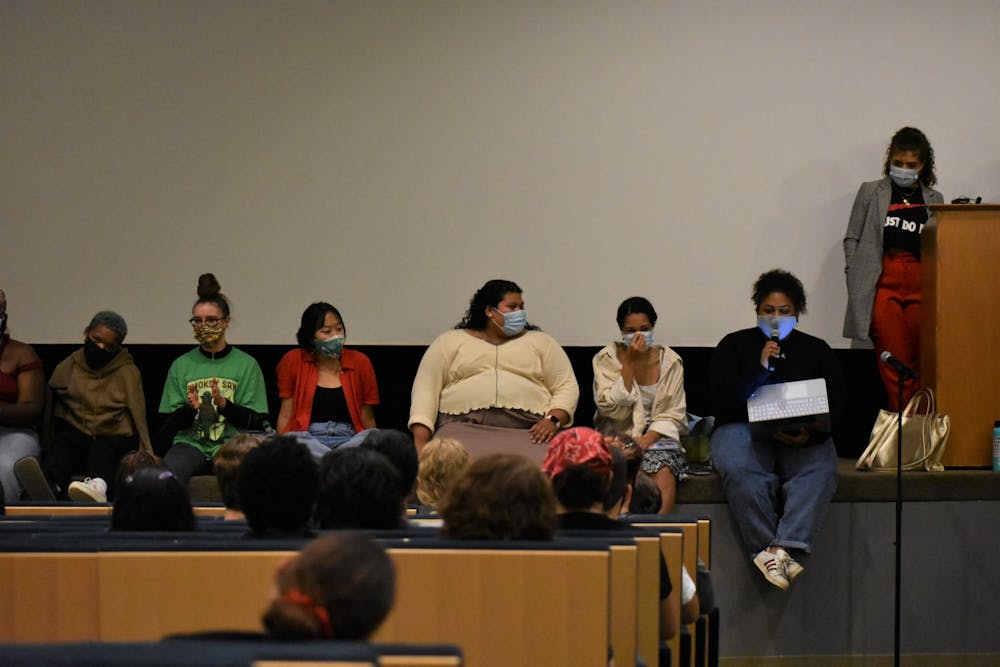Lea en español
Over 100 members of the University community gathered in Newcomb Hall Theater for the sixth annual Disorientation event Thursday evening. The student-led event included collaborative efforts from Political Latinxs United for Movement and Action in Society, Young Democratic Socialists of America at U.Va., undocUVA, Asians Revolutionizing Together and Student Council.
Disorientation was created as a juxtaposition to new student orientation, which is held the summer before the beginning of fall semester to help first-years and transfer students transition to life at the University. Disorientation recognizes and educates students on the history of racism and inequality at the University, featuring student leaders who share their viewpoints on various issues.
Many of the student organizers in attendance said the University has played little to no role in shedding light on its history since its founding.
This year, resident advisors and senior residents expect first-year students to go on a historical tour and debrief discussion centered around the history of enslaved laborers at the University. The program was created by students in the University Guide Service, Housing and Residence Life, Bringing Race into Dialogue with Group Engagement and History of Enslaved African American Laborers.
Gabriela Hernandez, third-year College student and chair of Student Council’s representative body, said student organizers and organizations are the ones pushing for progress.
“I feel like U.Va. administration has done absolutely nothing,” Hernandez said. “The work that we are seeing now is all student-led because student organizers are on the ground constantly fighting with administrators.”
Students said they would like to see further steps taken to inform incoming students about the University’s history such as peer-led conversations, informative seminars and classes dedicated to educating students on this topic.
“I think moderated conversations that go beyond surface level conversations are really important,” fourth-year College student Caro Campos said.
For the last three years, the University offered a class called “The History of Mr. Jefferson’s University,” which delivers a history of the University from its founding to present day. The interdisciplinary class focuses on how important it is to recognize the presence and impact of enslaved laborers on the founding of the University and is taught by members of U-Guides who design, run and administrate the class unpaid.
Disorientation leaders also discussed the history of eugenics and enslavement at the University, explaining that starting in 1910, the University was at the forefront of eugenics research. Amid recent efforts, Alderman Library — formerly named after well-known eugenicist and former University president Edwin Alderman — has been referred to as the Main Library throughout its renovation.
Student speakers also addressed the University’s history of dislocation. One example discussed was the University’s displacement of residents from Vinegar Hill, a predominantly Black neighborhood in Charlottesville. Architecture students wanted to erase Vinegar Hill to build apartments, speakers said, adding that the University continues to be an “unstoppable growth machine,” taking up more and more land in Charlottesville. As a modern day example, students suggested the new School of Data Science could have been put to better use by supporting public housing.
The University is currently committed to an affordable housing initiative that supports the development of over 1,000 housing units in the local community on land owned by the University over the next decade.
Students also spoke about their efforts to defund and abolish the University Police Department through the student-led group U.Va. Beyond Policing. Ceci Cain, vice president of Student Council and fourth-year College student — and member of U.Va. Beyond Policing — expressed the group's concerns regarding University police.
“Policing in the Western world is meant to protect people that are not Black, brown and low income,” Cain said.
Fourth-year College student Sarandon Elliott published an open letter Sept. 12 saying that she and peers have been approached by members of UPD in the last few months asking to speak with them. Cain also noted that UPD members asked her to set up interviews with other student leaders, including members of U.Va. Beyond Policing.
Other students shared similar concerns to Cain and Elliott regarding the presence of police officers on Grounds.
“The police force currently at U.Va. is mostly perpetuating harm and I don’t think any students would say they feel safer with them here,'' said fourth-year College student Donavon Lea.
Student counselors are currently working on a program that aims to remove police from mental health crises and intoxicated person crises. Currently, police officers can also answer phone calls at CAPS. YDSA recently launched a mental health campaign calling to end UPD involvement in mental health emergency responses.
“We have seen time and time again that police are not protecting students and if anything, police are the ones causing more violence towards students,” Campos said.
Another Disorientation event open to all students further addressing these topics will be held later this month.







